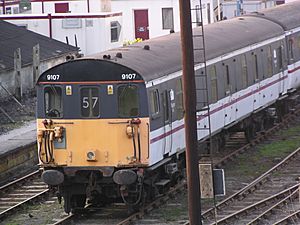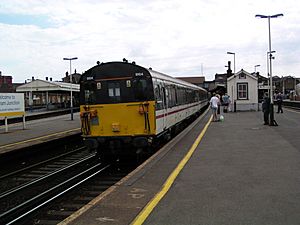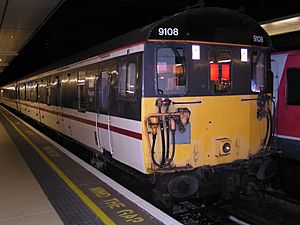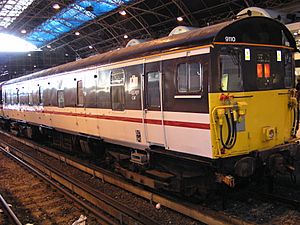British Rail Class 489 facts for kids
Quick facts for kids British Rail Class 489 |
|
|---|---|

489107 at Wirksworth Station on 17th April 2003. This train is one of two saved on the Ecclesbourne Valley Railway in Derbyshire.
|
|
| In service | 1983-2005 |
| Manufacturer | BREL Derby |
| Number built | Unknown |
| Formation | Unknown |
| Operator(s) | Gatwick Express |
| Specifications | |
| Maximum speed | 90mph (145km/h) |
| Electric system(s) | From powering loco/GLV |
The British Rail Class 489 was a special type of train. It was known as a GLV, which stands for "Gatwick Luggage Van". These trains were changed from older models to help carry luggage for passengers. They were used on the Gatwick Express service. This service ran between London Victoria and Gatwick Airport.



Contents
What Was the Class 489 Train?
The Class 489 trains were part of the British Rail network. They were not regular passenger trains. Instead, they were designed to carry luggage. They worked alongside other trains on the Gatwick Express route. This made travel easier for people flying from Gatwick Airport.
How Were These Trains Made?
These special trains were created by converting older models. They were originally part of the British Rail Class 488 series. These older trains were used for different purposes before. The conversions happened at BREL Derby. This was a major train manufacturing plant. The changes made them suitable for the Gatwick Express service.
When Were They Used?
The Class 489 trains started service in 1983. They ran for over two decades. Their main job was to help with luggage transport. They were a key part of the Gatwick Express operation. The trains were finally taken out of service in 2005.
Why Were They Important?
The Class 489 trains played a unique role. They helped make the Gatwick Express efficient. Passengers could check their luggage easily. This system helped speed up boarding times. It also made the journey more comfortable for travellers.
What Was Their Top Speed?
These trains could reach speeds of up to 90 miles per hour (145 km/h). This allowed them to keep up with the main passenger trains. They needed to be fast to ensure luggage arrived on time. Their speed was important for the express service.
Where Can You See Them Now?
After 2005, most Class 489 trains were retired. However, some were saved. One example is 489107. This train is now preserved on the Ecclesbourne Valley Railway. This allows people to see and learn about these unique trains. It helps keep their history alive.

